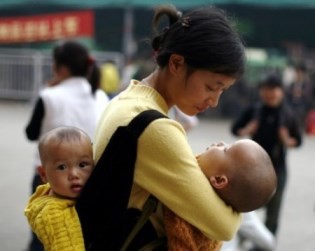A draft amendment to China's family planning law is encouraging couples to have two children but not more, according to a China Daily report.
The change, which has been stirring debate among Chinese citizens, comes after the government has decided to drop the decades-long one-child policy.
The proposal also suggests the removal of the right of those who get married or have children late to extend holidays.
Should the amendment pass, those who enjoy maternity and marriage leave will have 30 and seven days off, respectively.
Under the current law, regular maternity leave is three months. Men who marry at the age of at least 25 and women who marry by at least 23 are considered to have wedded late.
The draft amendment, which was advanced by the State Council, is set to take effect on Jan. 1.
According to Zhou Tianhong, a member of China's top legislative body, benefits such as longer maternity and marriage leave should be universal as the new trend encourages births.
Zhou, however, noted that "those with only one child should still enjoy the benefits because of policy continuity."
In the proposed changes, those who have only one child will stop receiving rewards from the government. But those who are granted with the "one-child allowance" before the amendment takes effect will still receive a government subsidy worth 120 yuan.
A netizen posted on Weibo: "I think those older than 40 who have only one child should continue to enjoy the allowance."
Another netizen named Hawthorn echoed the same sentiment, adding that "all childbearing should be encouraged."
Meanwhile, legislator Liu Zhengkui urged the government to make more policies that encourage births. "It's expensive to raise a child, and incentives should be given in terms of education and healthcare," Liu said.



























